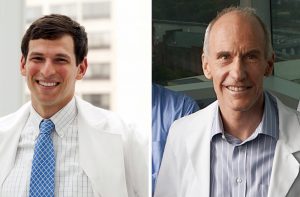by Melissa Moody
Penn Medicine researchers have developed a unifying definition of ‘cytokine storm’ to provide a framework to assess and treat patients whose immune systems have gone rogue.

One of the most elusive aspects for clinicians treating COVID-19 is the body’s immune response to the virus. In the most severe cases of COVID-19, the immune system goes into overdrive, resulting in a fever, multiorgan system damage, and often death—a cytokine storm. But how to detect and treat a cytokine storm requires that clinicians can identify it as such.
Two Penn Medicine researchers have developed a unifying definition of “cytokine storm” to provide physicians with a framework to assess and treat severely-ill patients whose immune systems have gone rogue. Cytokine storms can be triggered by different pathogens, disorders, or treatments, from COVID-19 to Castleman disease to CAR T cell therapy.
In a paper published in the New England Journal of Medicine, David Fajgenbaum, an assistant professor of translational medicine & human genetics and director of the Center for Cytokine Storm Treatment & Laboratory (CSTL), and Carl June, a professor of pathology and laboratory medicine and director of the Center for Cellular Immunotherapies in the Abramson Cancer Center, and the Parker Institute for Cancer Immunotherapies define a cytokine storm as requiring elevated circulating cytokine levels, acute systemic inflammatory symptoms, and secondary organ dysfunction beyond what could be attributed to a normal response to a pathogen, if a pathogen is present.
“There has never been a defining central review of what a cytokine storm is and how to treat one, and now with COVID-19, that is a major issue,” says Fajgenbaum, a Castleman disease patient who has previously experienced five cytokine storms himself. “I’ve spent the last 10 years of my life as a cytokine storm patient and researcher, so I know the importance of having a comprehensive unified definition to find therapies that work across the various types of cytokine storms.”
There is widespread recognition that the immune response to a pathogen, but not the pathogen itself, can contribute to multiorgan dysfunction and other symptoms. Additionally, similar cytokine storm syndromes can occur with no obvious infection.
Read more at Penn Medicine News.
NB: Carl June is a member of the Penn Bioengineering Graduate Group.
